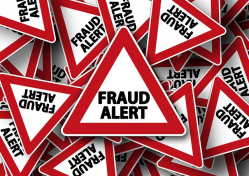The Fraud Examiner: The Emotional Impacts of Fraud

I stood there in Gary’s office. My client was a giant of a man. The leader of his company. Stoic. Reserved.
Me, a young woman, barely 30, investigating one of the first fraud cases I had been engaged to conduct, and certainly the biggest fraud I had seen to date. Within 48 hours of arriving at my client’s location, I was staring at a fraud in excess of $1 million and I had barely scratched the surface.
I came in to inform him that what he had thought was an undisclosed “loan” taken out by his long-time controller was no loan. And the amount was much larger than the amount the controller had confessed to just a few days earlier.
There was little doubt that this was a fraud of significant proportion. And, I was wholly unprepared for his reaction to the news. This stoic man, reserved and distinguished, began to cry.
Through his tears he asked questions I was also unprepared for:
“What’s wrong with me, Tiffany, that I trusted him?”
“If I can’t trust ‘Tom,’ then who can I trust?!”
“What kind of idiot lets this happen to him?”
As I looked around the room desperately trying to find a tissue box (non-existent) and trying to make myself small so as to give him space to compose himself, a thought formed in my head — His reaction has nothing to do with the money. It has everything to do with the breach of trust.
Words escaped me at that moment. There was nothing I could do or say that would be sufficient.
The only thing I was able to come up with was, “I’m sorry, Gary. I’m so very sorry.”
In the decade since that first experience, I have noticed a pattern with all my clients, whether they are the owners of small, closely held businesses, board members of a nonprofit organization or even CEOs of publicly traded companies — the first reaction to fraud has nothing to do with the money lost. It has everything to do with the emotions that accompany trust being breached.
Fraud is typically perpetrated by the most trusted individuals in my clients’ organizations. These fraudsters are the last ones who would ever be suspected of such nefarious activity and the result is an understandable, gut-wrenching heartache experienced by clients.
Knowing this, how do we as fraud examiners broach the emotional impacts of these situations with empathy and care yet still leave room for the professional skepticism and unbiased methodologies we must undertake to perform our jobs?
Is there room for both?
I maintain that there is not only room for it, but dealing with the emotional impact of fraud should be an essential consideration in every engagement.
How many engagements have you walked into where the client “knew something wasn’t quite right” but ignored it for weeks, months or even years? How many coworkers of fraudsters have you interviewed who are torn between what they thought they knew about the fraudster and what is being exposed in their absence? How many clients have hired you to investigate what appeared to be a small matter only to discover that losses were much greater than originally understood? Each of these situations would understandably cause any human being to freeze, look inward and go quiet. And, all too often, just like Gary, they struggle with the embarrassment, anger and sadness that goes along with “What’s wrong with me that I trusted this person?”
In these situations, our first job is not to ask for an engagement letter and retainer. It’s not to ask for documents. I maintain that it is our first job to start with “I’m sorry.” Letting those people know that on a human level we are sorry they are dealing with this situation.
From there, I find that giving clients room to express their feelings, whether tears of sadness or angry outbursts, engenders trust between me and them. (Note: Always carry tissues in your briefcase). Especially if I tell them kindly that even though they think they are alone in their feelings of mistrust or anger or sadness, this reaction is all too common.
That engendered trust allows me to ask the single most important question in my investigation, “Tell me about [fraudster]. Tell me what you know about them here at work and anything personal you think you might know as well.”
One client told me it felt like therapy. I’m no psychologist, but I have come to find out that my initial interactions with clients are very much like therapy. Necessary for them, and necessary for me too. Their “therapy” paves the way for me to gain information I may not have learned otherwise — information that can be critical to my case.
Identify your path to CFO success by taking our CFO Readiness Assessmentᵀᴹ.
Become a Member today and get 30% off on-demand courses and tools!
For the most up to date and relevant accounting, finance, treasury and leadership headlines all in one place subscribe to The Balanced Digest.
Follow us on Linkedin!
